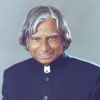Abdul Kalam

Abdul Kalam
Avul Pakir Jainulabdeen "A. P. J." Abdul Kalamwas the 11th President of India from 2002 to 2007. A career scientist turned politician, Kalam was born and raised in Rameswaram, Tamil Nadu, and studied physics and aerospace engineering. He spent the next four decades as a scientist and science administrator, mainly at the Defence Research and Development Organisationand Indian Space Research Organisationand was intimately involved in India's civilian space program and military missile development efforts. He thus came to be known...
ProfessionScientist
Date of Birth15 October 1931
CityRameswaram, India
My worthiness is all my doubt His Merit- all my fear- Contrasting which my quality Does however appear
My message, especially to young people is to have courage to think differently, courage to invent, to travel the unexplored path, courage to discover the impossible and to conquer the problems and succeed. These are great qualities that they must work towards. This is my message to the young people.
Our nation is facing a major challenge of uplifting 260 million people who are below poverty line and we have to give better life for many millions who are on border line of poverty or just above the poverty line. To meet the needs of one billion people we have the mission of transforming India into a developed nation .... We have identified five areas where India has a core competence on integrated action for agriculture, food processing, education and health care, reliable and quality electric power, surface transport and infrastructure for all parts of the country, information technology and other strategic sectors.
On behalf of the Government and people of India and on my own behalf, I would like to convey to you and to the people of Pakistan our heartfelt sympathies.
The military will be testing for HIV in new recruits and undertake pre-natal examination of wives of personnel in the services,
The right signal is that technology is going to boost (economic) development of our nation,
The school hours for children are the best time for learning, and need the best environment and mission oriented learning with value based educational system.
Science leads to development of technologies. Availability of technologies leads to products.
These changes will have a major impact on the fiscal deficit of states, apart from bringing down the costs of doing business,
I have already met one million youth and when they grow up what they will say about me is most important for me.
How accurately can the law fix the crime? There has to be a mechanism for very fast action. The law is like this: catch them and punish them.
A teacher should have a creative mind.
All wars signify the failure of conflict resolution mechanisms, and they need post-war rebuilding of faith, trust and confidence.
DONT DECLARE HOLIDAY ON MY DEATH, INSTEAD WORK AN EXTRA DAY, IF U LOVE ME